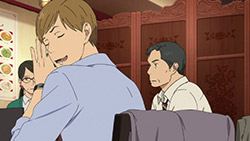 |
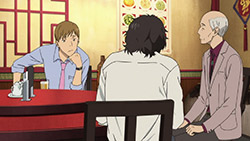 |
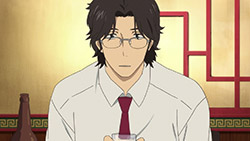 |
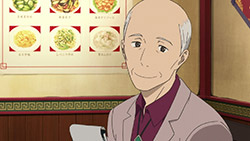 |
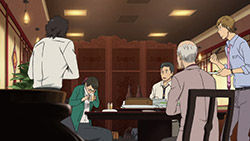 |
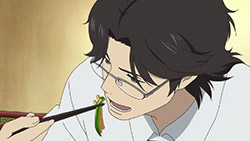 |
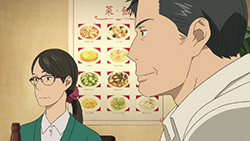 |
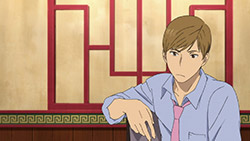 |
 |
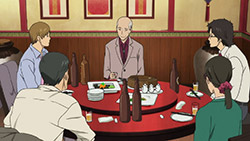 |
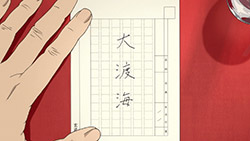 |
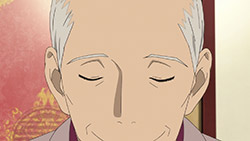 |
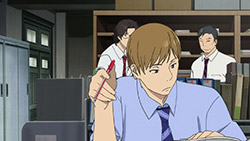 |
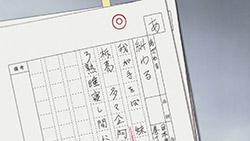 |
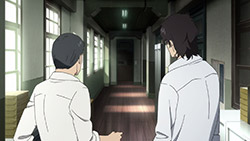 |
 |
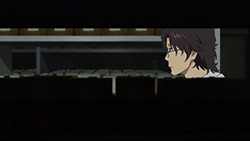 |
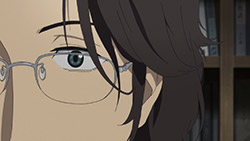 |
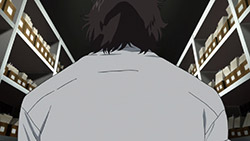 |
 |
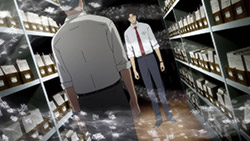 |
 |
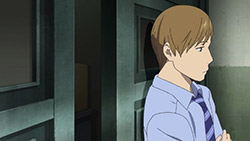 |
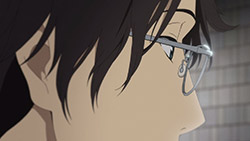 |
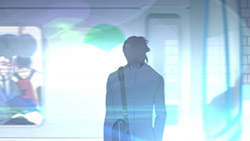 |
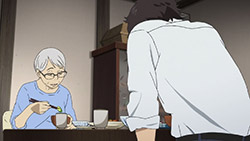 |
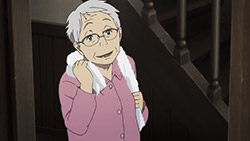 |
 |
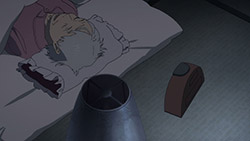 |
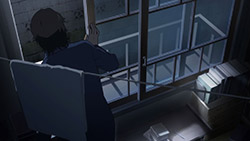 |
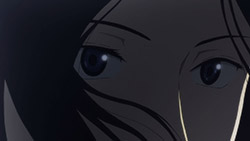 |
 |
 |
 |
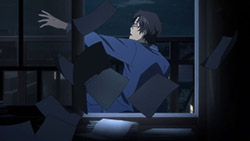 |
 |
「逢着」 (Hochaku)
“Encounter”
I should begin by saying that I may not be able to get a double meaning out of the Kanji characters every week. Last episode made it easy and fit with the imagery presented to us, but the “Encounter” seen at the end of this week was pretty straight forward and I couldn’t find any other reasonable interpretation for the title. If anyone else can dig up some hidden meaning that fits with this week’s themes, then feel free to share below and educate the masses about the intricacies of the Japanese language.
Now, onto the episode. And what an episode. I said it last week, but Fune wo Amu sure does hit that 2009 Noitamina sweet spot. It’s like a breath of fresh air, bringing in a mature, adult drama that goes against the wave of many seasonal anime. Who would have thought a show about a making a dictionary would be so enthralling. I’m a lucky blogger, getting to cover three anime this season that excel at pacing; at making the audience feel just what they intend, and setting a mood and atmosphere with the way dialogue is delivered and how scenes transition. Fune wo Amu is much more like Hibike! Euphonium in its confident yet slow pace that delivers the drama bit-by-bit. In comparison, Yuri!!! on Ice is going at a mile-a-minute, but I’m glad to have that variety in what I can discuss. All three shows are well-directed and among the best animated of the season as well.
Other than Majime’s occasional epiphany, there are few occasions where the animation and art design is anything out of the ordinary; most of the scenes are set in a real-world environment with little room for exaggeration. Instead, we get lovely character animation that is smooth and detailed, making it feel like care has been put into each frame. It’s easy on the eyes, paired with a directing style that mimics a live-action film, we’ve got something very atypical compared to a lot that’s on offer. As for those moments of bliss and euphoria, they are pretty spectacular. They tend to be fast – almost too fast – and happen so suddenly, and stick out from the regular pace of the show, which works in its favour. When things seem out of the ordinary, we feel that due to the shift in tone, colour palette, and the speed at which the frame linger on-screen. It’s those subtle details that elevate this to a higher level.
As for plot, not too much happened this episode. We mainly watched on as Majime took part in long conversations with his new workmates and the old woman who lives in the same building as him. Not every word is essential, but the dialogue is conversational and believable, leading on to more moments of dictionary knowledge which frankly goes over my head. I understand the gist of what is expected of Majime and the tasks he has to undertake, but it appears the method to his madness is not going to be the key to success here; it’s the manner in which this seemingly mundane premise comes to life on-screen that will be worth talking about. And if that’s how I’ll measure the success of this episode, I’d say it was a winner. Not only that, but the final scene with Majime encountering a mysterious woman under the moonlit night was gorgeous. This meeting is sure to be integral to Fune wo Amu’s existence given how striking this woman’s introduction was. She’s said so little and done nothing but stand under the Tokyo night, yet I’m already as captivated by her presence as Majime himself.

I will preface my comment by mentioning that the following interpretation was provided by Iima Hiroaki, a Japanese dictionary editor working with the Fune wo Amu series staff as the final check for words/definitions in the show and does live commentary tweets with each broadcast on language used in the series. He also picks the subtitle name for each episode and is the one who chooses the given definition.
The very basic definition of 「逢着」 is to encounter / meet. However, instead of being used to describe people meeting, its most frequent use is to describe when one encounters a problematic situation or hardship. A direct synonym would be to face/confront (a problem/risks/difficulties).
Adding a personal and extra explanation which might sound repetitive but covers one of the biggest nuances of this term compared to other terms that describe meeting / encounter. 「逢着」 gives an interpretation of coming across something (likely with a more negative nuance) while other terms like 「邂逅」 which also translates as to meet describes meeting someone/something by chance (in a more positive note)
Awesome, thanks for the info!
This is a spoiler from me who watched the movie version:
Show Spoiler ▼
It’s unbelievable to see so few comments on this anime, is a little sad because I’m really enjoying it very much. Also in my personal opinion I think is one of the best this season.
It’s a true shame, but I encourage you (and the silent viewers out there) to keep commenting so we can discuss this gem.
zzzzzzzz…
This already goes beyond my expectations. As for now, the show has excellent pacing, it has great visuals too. And that final scene had something special, it really got me. I wonder how the series will develop for next episodes, but right now it’s nothing more than satisfying.
If I were to guess why it isn’t that popular, well, you pretty much said it Samu – it’s mature, adult drama, definitely not for everyone to be appreciated, not the kind of anime that encourages others to watch by itself. I wasn’t even sure if I want to follow it this season, thinking ‘can anime about dictionaries be any good’, but now I know I made the right choice.
Also, I heard the rumours that it will air for 11 eps, can someone confirm it?
It’s certainly not a series for everyone, but those shows tend to be a higher quality anyway. As for it being 11 episodes, that’s very likely since this is a Noitamina anime. It may get 12 if we’re lucky, but chances are however many episodes it has will be enough to tell the entire story which is fine by me.
In myanimelist is written that will have 11 episodes. so..
The encounter in the end with the woman reminded me of the scene from Hyouka, when Chitanda wraps Oreki in her hair. It’s not as visually showy as the Hoyuka scene (Majime being transported into his own “blue-skyed” world as he falls down), but the moment still made a really great impact.
Love subtle shows like these. It’s literally a refresher hehe
Ah, that’s a nice call back! I can see why you would compare the two.
Watched Hyouka recently, and this scene is indeed quite similar in a way u.u
Well… Don’t know what to say. Was a big fan of the first episode and a bigger one of the second. Liked all the content on this episode, the doubts that Hajime had about himself (If he was going to let everybody down or if he could not fit with the rest of the department), even though these themes are nothing new i still think that they bring some “humanity” to the character and seeing them feeling anxious in something that i definitely would, makes this weird connection between me and said character.
But still the ending was the strawberry on top of the cake (somehow i think i got this expression wrong -,-”). The encounter with the women in the end was simply beautiful while being unexpected and mysterious.
Ps: Good thing about watching the episode this late is that now i’m gonna watch the 3rd episode tomorrow :3
…Just realized that i typed the guy’s name wrong -,-” It’s Majime not Hajime (Probably just got confused with Hajime no ippo u.u)
Since I am quite fond of this show, focusing on the aspects I dislike or am uncertain of seems more appropriate for conversation fodder.
Foremost, a well-written “chance encounter” is hard to come by, but unfortunately I didn’t buy the chastising random salesman from my company (but perhaps I’ve placed too much emphasis on keigo culture[shrugs]).
On the periphery, I am not fond of how the “perfect” replacement for someone has to be someone singularly sentenced to value their trade/past-time/etc rather than be a more real person; I know that there are really people that can devote their entire being to one thing just as anyone else that has gone through academia can refer you to that professor(s) that embodies such ideals.
It just bothers me such an ideal candidate was just a salesman rather than being connected to a closer line of work (i.e. a struggling consulting job, a company committee that requires linguistic nuance, other idealized starting point).
Petty (Everyone’s a critic style) grievances aside, I’m always glad to see more introverted protagonists and down-to-Japan series. Still curious how the staff will balance the profound slice of life moments with the mundane feel of monotonous work (subjective point I know; I ask you kindly stow the pitchforks for later)?
Will we see more exaggerated work crises ala ShiroBako? Or are we in for the truer to life, yet compartmentalized depictions of drama like in Sore ga Seiyu? Or further still,will the sagacious slice-of-life wisdom spring up outside of work all together like in Barakamon? As long as it is done well, I’ll be satisfied, but I lack the foresight to assert how the development in these types of shows will be portrayed.
Cheers to anybody that read through my insomnia-inspired insanity. #ISwearI’mNotAPundit o_o7